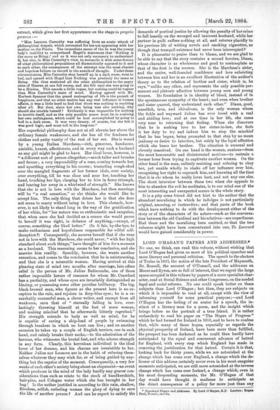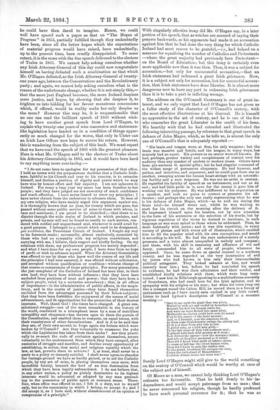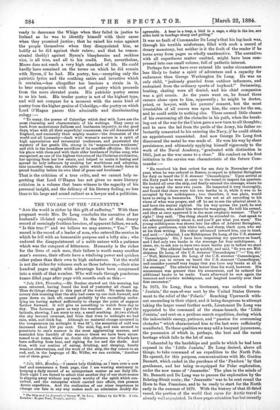LORD O'HIGAN'S PAPERS AND ADDRESSES.* No one, we think, can
read this volume, without wishing that Lord O'Hagan had given us more of his political speeches and more literary and personal criticism. The speech to the electors of Tralee in 1863, the notice of the late President of Maynooth, Dr. Russell, the account of O'Connell, and the addresses on Moore and Byron, are BO fall of interest, that we regret the large space occupied in this volume by papers of a more specialist char- acter, read at Social Science and other Congresses, on the needed legal and social reforms. No one could speak better on these subjects than Lord O'Hagan ; but then, they are subjects on which it is impossible to read at all, except with the view of informing yourself for some practical purpose ;—and Lord O'Hagan has the feeling of an orator for a speech, the in- stinct of a literary man for a poem, and the insight which brings before us the portrait of a true friend. It is rather melancholy to read his paper on "The Hopes of Progress" which he had formed for Ireland in 1853, and to have to confess that, while many of those hopes, especially as regards the physical prosperity of Ireland, have been more than fulfilled, the prospect has been darkened as he could then hardly have anticipated by the equal and concurrent advance of hatred for England, with every step which England has made in removing the justification for that hatred. Certain it is that, looking back for thirty years, while we are astonished at the change which has come over England, a change which the de- liverer of this address certainly never even in his most sanguine moments anticipated, we are still more astonished at the inverse change which has come over Ireland, a change which, even in his most desponding moments, the Mr. O'Hagan of that day would have thought it madness to anticipate as the direct consequence of a policy far more just than any * Occasional Papers and Addresses. By Lord 011agau, K.r. Loudon: Eagan Paul, Trenoli, au l Co. he could have then dared to imagine. Hence, we could well have spared such a paper as that on "The Hopes of Progress" in 1853, partially fulfilled though they undoubtedly have been, since all the better hopes which the expectations of material progress would have raised, have undoubtedly, up to the present time, been cruelly disappointed. To some extent, it is the same with the fine speech delivered to the electors of Tralee in 1863. We cannot help asking ourselves whether any Irish Attorney-General of this day could now congratulate himself on having defeated such a combination as that which Mr. O'Hagan defeated, as the Irish Attorney-General of twenty- one years ago, between the Conservatives and the Revolutionary party; and again, we cannot help asking ourselves what is the reason of the unfortunate change, whether it is not simply this,— that the more just England becomes, the more Ireland despises mere justice, and hopes, by showing that she despises it, to frighten us into bidding for her favour monstrous concessions which, if offered, would in reality make her only despise us the more ? However this may be, it is unquestionable that no one can read the brilliant speech of 1863 without wish- ing to have another great speech from Lord O'Hagan, to explain why twenty-one years of wise concession and statesman- like legislation have landed us in a condition of things appar- ently so much changed for the worse, that only in Ulster can an Irish Law Officer now hope to secure his return. However, this is wandering from the subject of this book. We must repeat that we have read the speech of 1863 with the greatest pleasure. Here is what Mr. O'Hagan said to the electors of Tralee about his Attorney-Generalship in 1863, and it would have been hard to say anything more convincing :— "I do not come here to apologise for my possession of that office. I hold no terms with the preposterous doctrine that a Catholic Irish- man, faithful to his Church and true to his country, is to ostracise himself, and decline a position of dignity and power which he may have won by honest effort and fair capacity. I am not unknown to Ireland. For many a long year my name has been familiar to her people; and they have judged me not unworthy of much confidence and much affection. I have never feared to avow my principles ; I have never shrunk from the endeavour to advance them. To men of my own religion, who have mainly urged this argument against me, it is thoroughly known that no year, for twenty which are gone, has passed without some public service of mine to those with whom, in race and sentiment, I am proud to be identified ;—that there is no district through the wide realm of Ireland in which prelates, and priests, and laymen will not be found to testify to such service, ren- dered with cordial and nnpurchased zeal, whenever it could avail for a good purpose. I belonged to a circuit which used to be designated, per excellence, the Protestant Circuit of Ireland. I fought my way to its foremost ranks ; necessarily, almost exclusively, sustained by those who had no sympathy with my religions convictions, and carrying with me, I believe, their respect and kindly feeling. On my relations with them, my professional progress has mainly depended ; and what I have done for my own people, I have done from no hope of profit or wish to advance myself. When the Attorney-Generalship was offered to me by those who knew well the course of my life and the principles I had ever asserted, it was offered without solicitation, and accepted without qualification or condition—without change of that coarse or compromise of those principles. For many generations, the just complaint of the Catholics of Ireland has been that, in their own land, they have been without influence ; that they have been excluded from positions of trust and power; that they have been a subject people, ruled by a sectarian ascendancy ; that, in all offices of importance—in the administration of public affairs, in the magis- tracy, and in the courts of justice—they have found themselves excluded from the advantages possessed by their fellow-subjects ; that they have been forbidden the enjoyment' of the means of social advancement, and fit opportunities for the protection of their dearest interests. Well, thank God ! the times have changed. A great con- stitutional struggle—one of the most remarkable in the history of the world, conducted to a triumphant issue by a man of matchless intrepidity and eloquence—has thrown open to them the portals of the Constitution, and enabled them to compete, on equal terms, with their countrymen of other denominations. And is it to be said that they are, of their own accord, to forge again the fetters which were broken by O'Connell ? Are they voluntarily to reassume the yoke which the Legislature has taken from their necks ? Are they practi- cally to re-enact the code of exclusion against themselves return voluntarily to the enslavement from which they have escaped, after centuries of struggle and sacrifice, and decline every opportunity of establishing, in action, that social and religious equality which the law, at last, permits them to achieve ? I, at least, shall never be a party to a policy BO insanely suicidal. I shall never agree to abandon the vantage-ground we have so hardly gained, or to aid the Catholic people, by any act of mine, in placing themselves once more, with incredible fatuity, beneath the heel of an iron domination from which they have been legally enfranchised. I do not believe that, in any other nation, a policy so plainly destructive to its highest interests would be advocated or adopted by any man pretend- ing to the possession of public spirit or common sense. There- fore, when office was offered to me, I felt it a duty, not to myself only, but to the community to which I belong, to accept it ; and I did accept it, as I have said, without abandonment of an opinion or compromise of a principle." With singularly effective irony did Mr. O'Hagan say, in a later portion of his speech, that as witches are accused of saying their prayers backwards, so his opponents had made it an accusation against him that he had done the very thing for which Catholic Ireland had most reason to be grateful,—i.e., had helped on a measure for equalising the number of Catholics and Protestants —where the great majority had previously been Protestant— on the Board of Education; but this irony is certainly even more applicable now than it was then. Then, it was a subject for accusation,—but only for unsuccessful accusation,—that an Irish statesman had redressed a great Irish grievance. Now, it is a subject not only for accusation, but for successful accusa- tion, that Irish statesmen have done likewise. It is almost more dangerous now to have any part in redressing Irish grievances than it is to take a part in inflicting wrongs.
The address on the O'Connell Centenary is one of great in- terest, and we only regret that Lord O'Hagan has not given us a fuller study of the character of O'Connell's oratory, with the most effective illustrations at his disposal. He is himself no apprentice in the art of oratory, and he is one of the few who remember the great Liberator in the zenith of his fame. We heartily wish that he had extended and illustrated the following interesting passage, by reference to that great speech in defence of John Magee, which, as he tells us, is almost the only one of O'Connell's that is adequately reported
His brain and tongue were, at first, his only weapons ; but the was massive and fertile, and the tongue, in many ways, has scarcely had an equal. His powers as an orator were all his own. He had, perhaps, greater variety and completeness of control over his auditory than any speaker of ancient or modern times. Others have. been pre-eminent in special gifts ; but he had singular command of the widest range of persuasive eloquence. He had humour, and pathos, and invective, and argument, and he could pass from one to another, sweeping across the human heart-strings with an astonish- ing facility and a sure response. He was not an artist in oratory. He regarded his faculty of speech as an instrument, and not as an end ; and had little pride in it, save for the means it gave him of working out his purposes. He was indifferent to his reputation as a speaker, and took no pains to correct or preserve his ad- dresses ; and perhaps the only one really representing what he was is his defence of John Magee, which—as be told me during the State trial—he himself wrote out, whilst he was waiting to. start for his circuit on the morning after the delivery of it. He impressed himself upon his hearers, not by nice attention to the form of his sentences or the selection of his words, but by vigorous repetition of the views he desired to inculcate, in snob language as was most suited to those whom he addressed. Thus, he dealt habitually with juries ; and it was this repetition, in every variety of phrase and with every aid of illustration, which enabled him to fill the popular mind with his own conceptions, and mould it according to his will. He had the rare endowments of a stately presence, and a voice almost unequalled in melody and compass ; and these, with his skill in reasoning and affluence of wit and fancy, commended him to all sorts of people, wherever he appeared. Once, he came down as special counsel to a northern county, and he was regarded as the very incarnation of evil by jurors who had known in him only their irreconcileable political antagonist. They looked askance at him, and would scarcely hear him ; but, before be had concluded him speech to evidence, he had won their admiration and their verdict, and established kindly relations with them, which were long main- tained. I saw him in Edinburgh speaking to a multitudinous assembly of Scotchmen, who had small love for the Irish agitator, and no sympathy with his religion or his race ; but when his voice rung out. like a trumpet round the Calton Hill, he moved them to a frenzy of enthusiasm such as I have rarely seen excited in any Irish crowd. Listen to Lord Lytton's description of O'Connell at a monster meeting :— ' Once to my sight the giant thus was gives,
Walled by wide air and roofed by boundless heaven, Beneath his feet the human ocean lay, And wave on wave flowed into space away. Bethought no clarion could have sent its sound E'en to the centre of the hosts around ; And, as I thought, rose the sonorous swell, As from some church-tower swings the silvery bell.
AD-ft asd clear from airy tide to tide It glided easy, as a bird may glide—
To the last verge of that vast audience sent ; It played with each wild passion as it went ; Now stirred the uproar—now the murmurs stilled, And sobs or laughter answered as it willed. Then did I know what spells of infinite choice To rouse or lull has the sweet human scam Then did I learn to seize the sudden clue To the grand, troublons life antique—to view, Under the rock-stand of Demosthenet
Unstable Athens heave her noisy seas!".
Surely Lord O'Hagan might still give to the world something on the oratory of O'Connell which would be worthy at once of the subject and of himself.
Of Moore as a man, we cannot help thinking Lord O'Hagan's estimate too favourable. That he held firmly to his in- dependence, and would accept patronage from no man ; that he never renounced his religion, though he hardly professed to have much personal reverence for it ; that he was as
ready to denounce the Whigs -when they failed in justice to Ireland as he was to identify himself with their cause
when they promised justice ; that he raised his voice against the people themselves when they disappointed him, as boldly as he did against their rulers; and that he remon- strated (feebly) against Byron's blasphemies and reckless vice, is all true, and all to his credit. Bat, nevertheless, Moore does not reach a very high standard of life. He could hardly have remained on the terms on which he did remain with Byron, if he had. His poetry, too,—excepting only the patriotic lyrics and the scathing satire and invective which
it contains.—has altogether too luscious a strain in it, to bear comparison with the sort of poetry which proceeds from the more elevated poets. His patriotic poetry seems to us his best. His tender poetry is not of the highest type, and will not compare for a moment with the same kind of
poetry from the higher genius of Coleridge,—the poetry on which Lord O'Hagan passes this admirable and discriminating eulogy :—
" To many, the poems of Coleridge which deal with Love are the most charming and characteristic of his writings. They carry us back from monotonous dullness and loathsome impurity, to the good days, 'when with all their superficial coarseness, the old dramatists of England, and eminently their mighty master—the dramatist of the world and all humanity—dealt with woman's nature in a spirit of high appreciation and reverential tenderness, and penetrated the mystery of her gentle life, strong in its 'magnanimous weakness,' and rich in the boundless sacrifices of its unselfish affection. He took his place with them and with their elder brothers of Italian song, who recognised, as one of the highest victories of the Christian civilisation, her uprising from her low estate, and helped to make it lasting and spread its holy influence by exalting her worthiness and adopting, into immortal verse, the chivalric spirit which bowed rude force in proud humility before its oWn ideal of grace and loveliness."
That is the criticism of a true critic, and we cannot help re- gretting that Lord O'Hagan has not given us more literary 'criticism in a volume that bears witness to the sagacity of his personal insight, and the delicacy of his literary feeling, no less than to his large and sound culture as a lawyer and a politician.




































 Previous page
Previous page